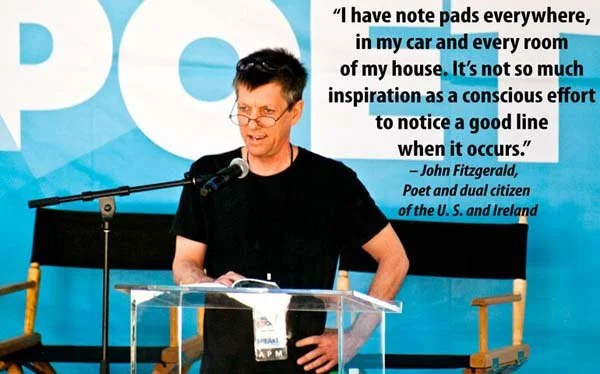By Megan Harlan
Vignette of last night, sly
in this moment’s illumination,
semi-precious pigments still
fluid in memory; marginalia
of volunteer plants—bell-heavy
fuchsias, wind-flung parsleys—
grown in our garden under noons
sprouted, rosetted with years;
prayer for patience, which we view
as improvisational comedy;
season in one room for miles,
rocking him—obsecro te—to sleep;
much of the zodiac is stained
with coffee, but still exquisite;
common hymns for an Everest,
a Venice, a seized interlude;
book on which to drum our hands
to the beat of our rationalizations;
recurring theme of lust’s dreamlike
replicas, lashing as electric arcs;
litany of ten minutes late,
waiting room, unanswered texts,
bordered by a migraine aura’s
spiked pyrotechnics;
apologies vivid as fairy tales,
their stark, bartered moralities;
prayer of adoration, which we view
as our shared landscape,
each hour a passage of light
ripening, diminishing, outlining
our proximities, as if together
we are equinox, solstice.
(first published in Crazyhorse)
Short Film / Performing Arts Submissions:
<b>The Importance of Arts, Culture & The Creative Process</b><br> We’d love to hear your thoughts on the importance of the arts and humanities and how this project resonates with you.: In my poems and creative nonfiction, I pose the questions that haunt me, then work on the page to discover why. What is the truest, most resonant shape that language—imagery, narrative, each choice of word—can make from this memory, obsession, tragedy, joy, hilarity, or heartbreak, and often all of the above at once? Art is how we humans corral our wild, ceaseless imaginations into concrete expressions, using the media—visual, musical, literary—that we have so cleverly invented and reinvented. And my own imagination is always ignited by that storehouse of human culture known as "the humanities." I've woven into my personal writing subjects like Stonehenge, Edie Sedgwick, Eichlers, the Sex Pistols, the history of motels, Avalon, Marie de France, Diane Arbus, Bedouin tents, Monty Python, and Robert Frank—always with the desire to widen the circles of relationship, to interconnect and alchemize new meanings. This project, the Creative Process, is extraordinary for its multidisciplinary outlook, innovative curation, and the clarity of vision within its capacious structure. It embodies the way art is an interaction as much as a creation.
What was the inspiration for your creative work?: "Our Book of Hours" was inspired by medieval European illuminated "books of hours": small, elaborately decorated prayer and calendar books commissioned—nearly always—for women. Though framed around the canonical hours, these radiant books also feature fascinating illustrations of daily life, astrology, and the natural world—and always with an emphasis on seasonal, cyclical change. I live in California and France, both places I love in such different ways, and I was thinking here of my favorite book of hours, France's 15th-century Les Très Riches Heures du Duc de Berry. That said, "Our Book of Hours" is a contemporary poem, drawing on medieval religious symbolism—a deep, maximalist source of art, imagery, and profound human experience. It's familiar to me from my Catholic upbringing, and I find it very moving despite my secular (if spiritual) nature.
Tell us something about the natural world that you love and don’t wish to lose.<br>What are your thoughts on the kind of world we are leaving for the next generation? : My favorite natural landscapes are coastlines, the littoral—any border where land and water meet. The way these places constantly change before your eyes—that glittering interplay of sky, water, earth, and all the forms of life that call these places home—feels especially alive to me. Throughout my son's life, my family has gravitated to California beaches where we've enjoyed many beautiful days—and where we've also participated in clean-ups, have learned about the changing climate in mammal rescue stations. You protect what you love.















































































